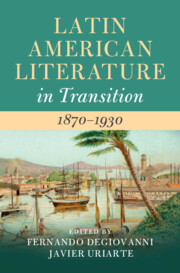Book contents
- Latin American Literature in Transition 1870–1930
- Latin American Literature in Transition
- Latin American Literature in Transition 1870–1930
- Copyright page
- Contents
- Figures
- Contributors
- Acknowledgments
- Introduction
- Part I Commodities
- Part II Networks
- Part III Uprisings
- Chapter 12 Anarchisms
- Chapter 13 Indigenismos
- Chapter 14 Abolitionism
- Chapter 15 Rural Insurgencies
- Part IV Connectors
- Part V Cities
- Index
- References
Chapter 13 - Indigenismos
from Part III - Uprisings
Published online by Cambridge University Press: 14 January 2023
- Latin American Literature in Transition 1870–1930
- Latin American Literature in Transition
- Latin American Literature in Transition 1870–1930
- Copyright page
- Contents
- Figures
- Contributors
- Acknowledgments
- Introduction
- Part I Commodities
- Part II Networks
- Part III Uprisings
- Chapter 12 Anarchisms
- Chapter 13 Indigenismos
- Chapter 14 Abolitionism
- Chapter 15 Rural Insurgencies
- Part IV Connectors
- Part V Cities
- Index
- References
Summary
Within scholarship on indigenismo, it is commonly held that the Indigenous uprisings in the southern Andes at the turn of the twentieth century spurred the cultural and political activities that we understand as the indigenista movement. Under the growing global demand for wool, these violent uprisings responded to new injuries accreted to old in a region where a variety of colonial relations, within an imaginary of coloniality, persisted. In this understanding of indigenismo, strangely, Indigenous peoples’ protest is interpreted to be an inspiration for indigenismo writ large. In contradistinction, this chapter reconceptualizes indigenismo by drawing on literature usually excluded by that term. The point is twofold: to illustrate the complex web of practices, often undertaken by Indigenous peoples themselves, in which indigenismo arose; and to reinvigorate our understanding of how local responses to transnational economic flows embodied a cultural imaginary that brought elite and nonelite actors together.
- Type
- Chapter
- Information
- Latin American Literature in Transition 1870–1930 , pp. 194 - 207Publisher: Cambridge University PressPrint publication year: 2022

